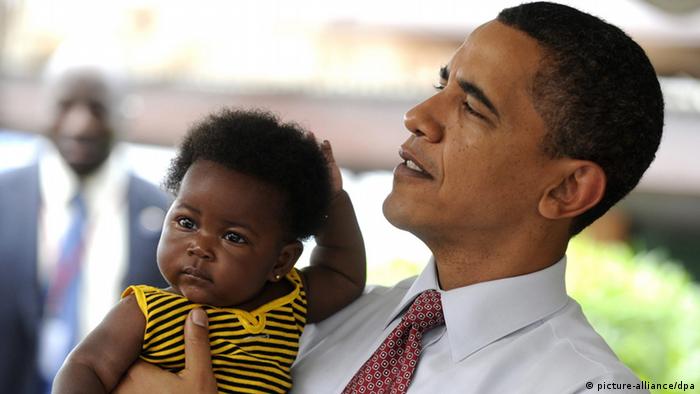President Obama is on his first major trip to Africa since taking office. Critics say he hasn't focused enough on the continent. DW talked to former US Assistant Secretary of State for African Affairs, Chester Crocker.
DW: Given Barack Obama's background, many observers assumed the president would make Africa one of his foreign policy priorities - but those expectations have been largely disappointed. Is it fair to say that Obama has neglected Africa?
Chester Crocker: Not every president rushes to travel to Africa. I think there are other criteria including receiving African heads of state here in Washington. More importantly there's the effort and activities of people in the State Department, or the Department of Defense who often operate somewhat beneath the radar. And you have to look there to African policy to see if there's any substance there or not.
If there's any overarching reason why he's only doing this now it's in part because he doesn't want to be seen as having some kind of special racial affinity, he doesn't want to be characterized or thought of that way.
So you wouldn't say that while the US has embarked on its so-called Asia Pivot and China and others are pursuing a robust Africa policy and are seizing business opportunities that Washington is in danger of being left behind?
I don't think that we and the Chinese compete in most arenas because we are such different countries and we have such different things to offer. But in the commercial field we do compete. So one of Obama's messages in going to Africa as it was for Secretary (of State) Clinton and now Kerry is that we want to see a level playing field in which US corporations are actively engaged, which is not so easy to organize because different countries have different rules when it comes to corporate diplomacy.
But isn't that exactly the problem for the US that certain countries apply different standards and practices?
Well, it's partly that question of what you might call good governance - or the absence thereof - and the rule of law - or the absence thereof, that's part of it. But there are other factors. The Chinese companies that come to Africa, or Latin America for that matter, often come with a combined full package that includes all kinds of credits that are officially endorsed, wrap-around construction projects with engineering and it's possible therefore for government officials to offer things which American officials couldn't possibly offer to an African partner. For that matter, German or British officials couldn't either.
So it's a question of a heavily statist economy, state-capitalism oriented economy having certain ways of proceeding which we simpy don't have. On the other hand we have advantages and compensating areas that I think are attractive in some cases to African partners. The other thing that I would add is that many African economies are tiny and it is very difficult to interest major American corporations in an economy that's fragmented into 54 pieces. So I think you see that large American companies tend to be quite selective in the way they engage in Africa, but when they're interested they really do engage.
So you do believe that Obama can convince both the US public and the commercial sector that the opportunities in Africa will benefit US interests?
There's no question they'll benefit US interests - that's why Walmart is coming to Africa, that's why a lot of financial institutions as well as natural resources extractive companies come to Africa. There are terrific opportunities. But I would say it's selective because of small markets, because of barriers to inter-regional trade.
There appear to be three key pillars that Obama is focusing on: economic growth and trade, democratic governance and grooming young African leaders. Which of those do you think is likely to be most successful?
In the long term grooming future leaders and encouraging expanded educational opportunities. It's a theme more than a project. It's the use of the bully pulpit, as we call it. Emphasizing the importance of African youth and young African leaders, reaching out to them and recognizing their potential. When it comes to democracy, we have a lot of commitments and programs in that area, but I think we have to look at the broader environment, we have to look at the rule of law, the question of building strong institutions.
And then we have to look at the environment in terms of peace and war. Is there a stable environment in which to attract the kind of growth and opportunity that we all want to see? And the story there is mixed. There's been a lot of progress in resolving African conflicts but there are also some very unstable areas where conflict continues or threatens.
You mentioned the issue of security. Military operations in Africa have increased, the drones program is just one example. Do you think Obama has over-militarized his Africa policy and possibly neglected other key areas?
There is an issue there worth mentioning but I don't think it's Obama so much as the way our country has organized itself. When what you basically have is a hammer, every problem looks like a nail and we have historically so over-emphasized our military tools of engagement that there's a temptation to use them everywhere and for everything and what's been under-resourced is our civilian agencies and our civilian tool kit, so I think that's an issue. But it is also the case that there are some genuine security problems in the region to be addressed in places like the Sahel and Mali, or northern Nigeria or the Great Lakes region, just to name a few.
Do you think Obama will be able to create an African legacy like Bush did with his HIV/AIDS initiative?
I don't know if he's really thought about it in those terms. It's all well and good to talk about things like trade and investment, democracy and rule of law, but in programmatic terms there isn't really that kind of legacy, nor can there be a whole lot of fresh spending because we don't have the fiscal situation to permit it. One thing that President Bush did was to spend an absolute fortune on HIV and AIDS and related health initiatives - in fact mortgaging much of our foreign assistance to that particular sector with the result that there is kind of a distortion in our foreign assistance priorities.
Yes, we've done a fabulous job in responding to African health crises but we have not done such a great job in responding to other things. But I don't see any evidence yet of the kind of legacy you're referring to. There are things the president could be doing that haven't yet been announced in terms of initiatives to support and promote greater corporate and business engagement and to promote the African private sector. So we'll see what comes out of the trip.
Chester A. Crocker is the James R. Schlesinger Professor of Strategic Studies at Georgetown University's Edmund A. Walsh School of Foreign Service and serves on the board of its Institute for the Study of Diplomacy. From 1981 to 1989 he served as Assistant Secretary of State for African Affairs. He developed the strategy and led the diplomacy that produced the treaties signed by Angola, Cuba and South Africa in 1988. dw de



No comments:
Post a Comment